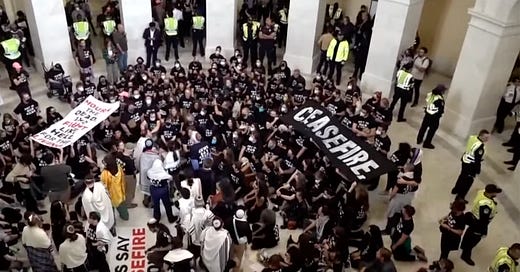16 NOVEMBER—The House of Representatives, the lower chamber in the U.S. legislature, has one Palestinian–American among its 435 members. Rashida Tlaib, no surprise, has been, this past month, a passionate advocate of a ceasefire in Gaza, human rights and humanitarian law, and a long-term peace between the Israeli state and the Palestinian people. In the afternoon of Tuesday, 7 November, she spoke of these things on the House floor.
“Speaking up to save lives, Mr. Chair, no matter faith, no matter ethnicity, should not be controversial in this chamber,” Tlaib said in her speech. “The cries of the Palestinian and Israeli children sound no different to me. What I don’t understand is why the cries of Palestinians sound different to you all.” Later in her remarks she choked back tears as she said, “I can’t believe I have to say this, but Palestinian people are not disposable. We are human beings, just like anyone else.” Before this speech, a controversial phrase: Tlaib had earlier invoked the common Palestinian saying, “From the river to the sea”—which, as she later described it, is “an aspirational call for freedom, human rights, and peaceful coexistence, not death, destruction, or hate.”
On Tuesday evening, a few hours after she spoke, the House voted by a considerable margin to censure Tlaib for these remarks. She was accused of supporting acts of terrorism, the eradication of Israel, and—this is standard in American discourse now—anti–Semitism. As to “From the river to the sea,” a legislator named Brad Schneider, who is Jewish and a liberal supporter of the Jewish state, described it as “nothing else but the call for the destruction of Israel and murder of Jews.”
What did we witness as we watched these proceedings on C–Span last week? What did we hear? Setting aside the highly charged politics of the Israel–Gaza catastrophe and the pro–Israel propaganda operation that now overtakes us, Tlaib’s abuse at the hands of her colleagues reflects a crisis that is less violent than the Israeli Defense Forces’ military campaign but no less significant. This is the perversion of language that the defense of Israel’s violence requires. And to pervert language in this way is to corrupt our public discourse, our public space, and altogether our ability to think clearly and take new directions.
Keep reading with a 7-day free trial
Subscribe to The Floutist to keep reading this post and get 7 days of free access to the full post archives.




